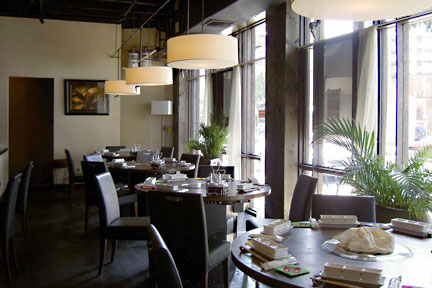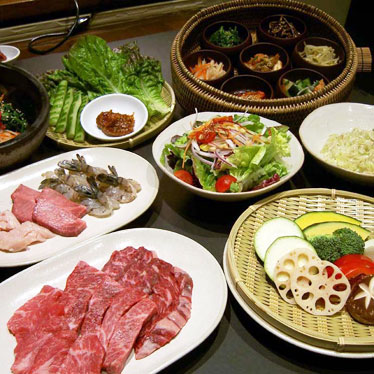
|
The Weekly Eater
|
Hot off the grill
AMERICA PERFECTED the distribution of fast food around the world, and that global dominance set an example for others to follow. Japan has been an exemplary student, having hit back with Tamagotchis, anime and all sorts of electronics and, now, the rise of the yakiniku restaurant.Combining good old U.S.-style expansion techniques with Korean culinary know-how, Japan has perfected the export of charcoal grill cooking.
You would think that someone from Hawaii, with our passion for the grill and familiarity with yakiniku cooking, would have been the first to claim ownership of the concept, but it never happened. All those ventilation problems, the idea of asking people to cook for themselves, and fear of bringing families -- with children -- and fire together must have been enough to detour the most ambitious entrepreneur.
Meanwhile, in Japan, Gyu-Kaku started eight years ago and now counts 800 restaurants there. Having conquered Honolulu, the gateway to the rest of the United States, the company is continuing its push east. Watch out, New York!

Toraji Yakiniku is the newest neighbor on Kapahulu avenue.
Just as at Gyu-Kaku, you can place a la carte orders for strips of raw meat, seafood and fresh veggies to throw on the grill. If 12 pages of instructions and menus are too much to comprehend, by all means go with one of the prix fixe menus for two: the Diamond Head ($49.50), Kaiulani ($69.50) or Kamehameha ($99). Chances are your a la carte spending will be in the Kaiulani range anyway. Plus, you'll expose yourself to dishes you might not try otherwise.
Order the Diamond Head set menu and you'll find yourself eyeing the "negibaka" ($3.75) -- raw beef served with raw egg and minced leek. I have nothing against beef carpaccio cut so thin as to be negligible, but this beef was more like lengths of phone cord that requires chewing, so will be tough for cowardly types to swallow.
Other grill-bound selections that don't translate for all are "mino" (tripe, $5.75) and beef tongue ($7.75). Of the two, I preferred the tripe, as rubbery as it turned out to be when cooked. The tongue, often described as a delicacy, was just too spongy too enjoy. I couldn't get beyond the idea of it.
Don't worry, there are plenty of other things to eat.

These are some of the dishes that form the Diamond Head set menu at $49.50 for two.
Because this is a "Korean" experience as interpreted by Japanese owners, there are some practices that will be unfamiliar, such as paying for the "namul," or assorted seasoned vegetables that we expect to be complimentary. These -- bean sprouts, spinach sprinkled with sesame seeds, royal ferns, kim chee, etc. -- run $1.75 a pop. Order a kim chee assortment for $5.75, or seven kinds of namul and kim chee for $9.75. These arrive in little wooden bowls tucked into an elegant woven straw basket.
The three dipping sauces that are meant to accompany the grilled meat also are more Japanese than Korean. Try them all. I couldn't choose a favorite as they all -- garlic, wasabi and bitter orange ponzu -- have their own unique effects on the cooked meat. If that is not enough, there are also soy and lemon sauces.
As for the various meats available, there is salt-marinated fatty pork ($5.75), "original sauce" tri-tip sirloin ($6.75), chicken ($4.75), skirt steak ($6.75) and Spam ($4.75). Vary these with dark miso-marinated kalbi, "harami" (skirt steak) and tri-tip ($8.75 each). Premium Kobe steak is also available from $18.75 for premium filet to $49.75 for ribs, but most will be satisfied sticking to the less pricey beef.
A small white disc, like a guitar pick, sits atop the raw meat. Toss that rice cake on the grill, too.
Toraji, meaning bellflower, bills itself as a healthy restaurant, so staffers recommend you balance that meat diet with vegetables and soup. Offered are spicy miso-rich "chiges" served in stone pots. I love the tofu chige ($7.75), which has proved to be too fiery to everyone I've dined with. The wimps. To give them the benefit of the doubt, the soup does arrive last, so they really might have been too full to eat much.
For dessert there is Chinese-style almond pudding ($5.75) that is creamier and richer than at most Chinese restaurants, but for something different, try the Korean rice cake, thick slices of mochi tossed onto the grill, browned, then rolled in maple syrup or honey and "kinako" (soybean flour).
949 Kapahulu Ave. / 732-9996 Toraji Yakiniku
Hours: 5 p.m. to 1 a.m. daily
Food 


Service 
Ambience 


Value 


Cost: $50 to $60 for two without drinks
Reservations: A must
    | excellent; |
   | very good, exceeds expectations; |
  | average; |
 | below average. |
To recommend a restaurant, write: The Weekly Eater, P.O. Box 3080, Honolulu, Hawaii 96802. Or send e-mail to nkam@starbulletin.com
[News] [Business] [Features] [Sports] [Editorial] [Do It Electric!]
[Classified Ads] [Search] [Subscribe] [Info] [Letter to Editor]
[Feedback]

